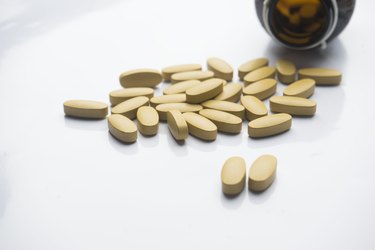
At the risk of stating the obvious, pregnancy and childbirth can have significant effects on your body. And while it's relatively uncommon, sometimes having a baby can affect your thyroid.
The thyroid gland is a butterfly-shaped gland at the front of your neck. It produces thyroid hormones, which keep your metabolism and body organs working properly, per the American Thyroid Association (ATA).
Video of the Day
Sometimes, changes during pregnancy cause the thyroid to secrete too much or too little thyroid hormone, resulting in a condition known as postpartum thyroiditis, according to the National Library of Medicine (NLM).
If you've been diagnosed with postpartum thyroiditis, or if you suspect you might have the condition, you probably (and understandably) have many questions and concerns. We've got you covered.
Here, experts answer the most common concerns about postpartum thyroiditis, including how long it lasts, its typical symptoms, how to get a proper diagnosis and what your treatment options are.
What Is Postpartum Thyroiditis, Exactly?
Postpartum thyroiditis is a disorder of the thyroid gland that affects approximately 5 percent of postpartum parents, per the NLM. It's characterized by periods of high levels of thyroid hormone (hyperthyroidism) and low levels of the hormone (hypothyroidism). Usually the condition starts with hyperthyroidism, followed by hypothyroidism.
Experts aren't sure exactly what causes it, but the condition is associated with autoimmune antibodies that affect the thyroid gland.
"It is usually a transient autoimmune disorder in people who have thyroid peroxidase antibodies (TPO) that are stimulated by pregnancy," says Mitchell Kramer, MD, board-certified ob-gyn and chairman of the department of obstetrics and gynecology at Huntington Hospital on Long Island.
You might be confused about the difference between postpartum thyroiditis and other thyroid conditions like Hashimoto's disease. However, they're not the same thing.
"Postpartum thyroiditis is different from Hashimoto's in that postpartum thyroiditis causes inflammation and is generally not destructive," explains Dr. Kramer. "In Hashimoto's, the thyroid gland is gradually and eventually destroyed by anti-thyroid antibodies and leads to hypothyroidism."
You might also wonder how long postpartum thyroiditis lasts. You can take comfort in knowing that the condition usually doesn't last forever. For most people, postpartum thyroiditis goes away within about a year.
Here's what a postpartum thyroiditis timeline looks like, according to the ATA:
- The hyperthyroid phase (too much thyroid hormone) begins within one to four months after giving birth and usually lasts between one and three months.
- They hypothyroid phase (too little thyroid hormone) begins about four to eight months after giving birth and can last between nine and 12 months.
Most people will see a resolution of symptoms by about one year postpartum. However, about 20 percent of people will continue to experience hypothyroidism beyond this timeframe, per the ATA.
Symptoms
Postpartum thyroiditis symptoms can vary from one person to another and may be more or less intense depending on which phase of the condition you are in, per the ATA. People are more likely to experience notable symptoms during the second phase (hypothyroidism) than they are during the first phase (hyperthyroidism).
According to the ATA:
- Typical first-stage symptoms (hyperthyroidism) include rapid heartbeat, irritability, anxiety, weight loss and exhaustion.
- Second-stage symptoms (hypothyroidism) may include exhaustion, depression, weight gain, dry skin, trouble concentrating and constipation.
Can Postpartum Thyroiditis Cause Depression?
In short, yes. Thyroid issues in general can cause changes in mood such as anxiety, irritability and depressive symptoms, per the ATA.
"Depression and anxiety can be associated with postpartum thyroid disorders due to the various symptoms, including difficulty concentrating, fatigue and metabolic changes related to abnormal thyroid hormone levels," Dr. Kramer says.
However, what's less clear is the connection between postpartum thyroiditis and postpartum depression, a serious mood disorder affecting about 1 in 7 birthing parents and characterized by persistent feelings of depression, exhaustion, guilt and trouble sleeping and focusing, per the NLM.
"There are some who believe that postpartum thyroiditis may increase the risk of postpartum depression," says Adi Davidov, MD, board-certified ob-gyn and associate chair of obstetrics and gynecology at Northwell Staten Island University Hospital in New York. "But this association has never been proven in clinical studies."
The ATA notes that although no studies have clearly linked postpartum depression with postpartum thyroiditis, any postpartum patient showing signs of depression should also be screened for a thyroid disorder.
Causes and Risk Factors
Anyone can get postpartum thyroiditis after having a baby. But according to Lisa Becht, MD, board-certified reproductive endocrinologist at HRC Fertility, people with positive thyroid antibodies (a sign of autoimmune disease) are more likely to get the condition. And the higher your antibody level, the higher your risk for developing the condition, she says.
As the ATA notes, other risk factors for postpartum thyroiditis include:
- Having a different autoimmune disorder, such as type 1 diabetes
- Having a history of other thyroid disorders
- Having had postpartum thyroiditis in the past
- Having a family history of thyroid disorders
How It's Diagnosed
If you present with symptoms of postpartum thyroiditis or if you have an increased risk of developing the condition, your health care team will test you for the disorder.
If you are at high risk, it's possible you will be tested for postpartum thyroiditis at three months postpartum and again at six months postpartum, per the NLM. If you have symptoms, you will likely be tested right away.
Postpartum thyroiditis is diagnosed by taking a sample of your blood and testing your levels of thyroid stimulating hormones (TSH) and thyroid hormones (T3 and T4).
Treatment
Exactly how postpartum thyroiditis is treated depends on which phase you are in, says Gunvor Ekman Ordeberg, MD, PhD, ob-gyn and co-founder of DeoDoc Intimate Skincare.
"The first phase (overactive thyroid/hyperthyroidism) often passes without obvious problems, but sometimes mild symptoms are present," says Dr. Ordeberg. If you are experiencing tachycardia (rapid heartbeat), this is usually treated with beta-blockers, per the ATA.
Once you are in the hypothyroid phase, you will usually have more noticeable symptoms, such as weight gain, exhaustion and depression. "Here the patient might need thyroid hormone replacement therapy," Dr. Ordeberg says.
According to guidelines from the American Thyroid Association, the treatment for hypothyroidism in people with postpartum thyroiditis is a medication called levothyroxine, which replaces the missing thyroid hormone.
Although some people search for a more holistic approach to treating postpartum thyroiditis, such as a postpartum thyroiditis diet, medical organizations such as the ATA don't have any particular dietary or lifestyle recommendations for people with this condition, and instead recommend that the condition be treated with medication.
After a year on levothyroxine, you can usually slowly wean off, though continued yearly thyroid testing is recommended to make sure you don't develop more long-lasting hypothyroidism.
It's generally safe to take low doses of levothyroxine while breastfeeding, per the British Thyroid Foundation. Indeed, the National Library of Medicine's Drugs and Lactation Database (LactMed) notes that levothyroxine is naturally present in human milk; what's more, the drug itself doesn't seem to pass into breastmilk well.
The British Thyroid Foundation notes you may want to talk to your doctor about taking the med in two to three doses spread throughout the day, but don't adjust your dose or the timing of your medication without the OK from your health care provider.
You should also talk to your doctor about the potential risks if you need higher doses of the medication.
When to See a Doctor
If you have any symptoms of postpartum thyroiditis, such as unexplained weight loss or weight gain, extreme exhaustion or mood changes, you shouldn't hesitate to reach out to your health care provider. You deserve to feel better and to get answers about what may be causing your symptoms.
FAQ
Common Questions
Can postpartum thyroiditis affect breastfeeding?
Having too much or too little thyroid hormone can affect lactation, per the ATA, so if you're having breastfeeding issues, such as low milk supply, consider talking to your provider about getting your thyroid checked.
Additionally, certain aspects of postpartum thyroiditis management may affect breastfeeding, says Dr. Davidov. For example, a radioactive iodine uptake test — which is used to measure thyroid function — is contraindicated during breastfeeding, she says.
This doesn't mean you can't breastfeed when you have postpartum thyroiditis. But it may be beneficial to work with a lactation consultant, who can help you navigate the particular challenges that can come with the condition.
Can postpartum thyroiditis lead to hair loss?
It’s common to experience hair loss postpartum due to your changing hormones, says Dr. Kramer, and this is normal for most people. However, postpartum hair loss can be exacerbated by postpartum thyroiditis, he says.
Can you get postpartum thyroiditis after a miscarriage?
It’s possible to develop postpartum thyroiditis after a miscarriage prior to 20 weeks, Dr. Kramer says. “But this is unusual and would be more likely to occur in high-risk individuals,” he notes.
- National Library of Medicine: "Postpartum Depression"
- National Library of Medicine: "Postpartum Thyroiditis"
- American Thyroid Association: "Postpartum Thyroiditis"
- American Thyroid Association: Clinical Thyroidology for the Public: "2017 Guidelines of the American Thyroid Association for the Diagnosis and Management of Thyroid Disease during Pregnancy and the Postpartum."
- British Thyroid Foundation: "Breastfeeding and Thyroid Disease"
- LactMed: "Levothyroxine"
Is this an emergency? If you are experiencing serious medical symptoms, please see the National Library of Medicine’s list of signs you need emergency medical attention or call 911.


